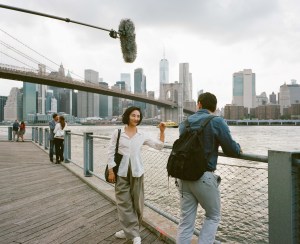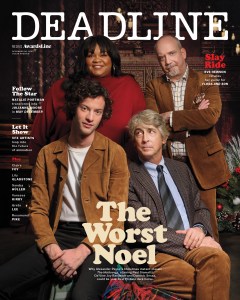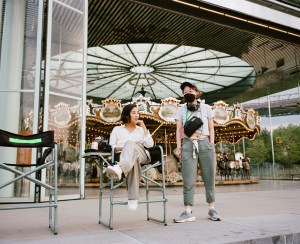The standout movie at Sundance this year, Celine Song’s indie hit Past Lives has touched the parts of the human heart not reached since Richard Linklater’s Before trilogy. Starring Greta Lee, it tells the story of Nora, a Korean-born playwright on the brink of breakout success in New York, who is taken by surprise when, out of the blue, her childhood sweetheart from Seoul, Hae Sung (Teo Yoo), makes contact on social media. Will it lead to some light nostalgic fun? Or is there something deeper — Koreans call it inyeon, the idea that some things are meant to be — that makes them soulmates?
DEADLINE: When did you first get involved with Past Lives?
GRETA LEE: I read the script a few years ago. It was sent to me by my agent, and the subject line just said, “Korean: Do you speak it?” To be honest, at the time I felt like, “Oh god, what a drag. I don’t know.” I was immediately stressed out at the idea of doing a movie in Korean, frankly. I hadn’t done that before. But, anyway, I went in blind. I didn’t know who Celine Song was. Even though we both have a theater background in New York, I wasn’t aware of her. But I finished with the script in one sitting.
There was a lot of crying. I mean, I don’t think I’ve ever had that experience, just trying to read while by being blinded by my own tears [laughs]. But I totally fell in love with that script. It felt like I immediately knew it was going to be something special, and I was desperate to be a part of it. So, I put myself on tape — and I didn’t get the job.
DEADLINE: What?
LEE: Yeah, I did not get the job. I thought at the time, “Well, someone is going to be very lucky to be able to do this,” and I tried to erase it from my memory, like a bad breakup. And almost exactly a year later, I got a phone call completely out of the blue asking if I remembered Celine Song, and would I be willing and able to meet with her that same day over Zoom? I was so confused, but apparently the casting had gone another way and there’d been some changes creatively. They were looking for — and I love this — “older” actors. I said, “Oh, thank you very much. Here’s where I come in!”
I had no time to prepare. It was a big leap of faith, and I just dove right in. We read some scenes together, and she ended up offering me the job on the spot that day. So, it has been a wild ride. My experience with becoming part of this project mirrors the essence of the movie, this idea of inyeon: destiny and connectivity. I feel like the script and I were soulmates [laughs]. Celine likes to say she’s certain we were married in another lifetime, although I’m not entirely sure she means that completely in a positive way!
From left: Greta Lee on set with director Celine Song.
Jon Pack/A24
DEADLINE: Once you were on board, what was the process like? It looks like a very well-thought-out film.
LEE: Absolutely. I think some people may assume, including myself, that a project like this, with a lot of silence, a lot of restraint and a certain kind of pacing, would be, like, a whimsical experience — the assumption being that we would be finding things in the moment, leaving things to chance. But that was entirely not the case. One of the things about Celine that is so incredible about her is how meticulous and how surgical this was. I mean, it was, without question, the hardest thing I have ever been asked to do.
I walked in with a lot of comedy on my back thinking, “Oh, how easy! Long days of just staring out the window? No problem.” [Laughs]. And I was immediately humbled by how incredibly difficult it was. I think most of that comes from the kind of movie we were endeavoring to make and being really hyper-specific about all of these pregnant pauses. It felt like following along some sort of musical score, if that makes sense. We could not waste a single second, because we were shooting with one camera on 35mm. We only had so much, so there was this preciousness in the process.
DEADLINE: How good is your Korean? Does your character speak perfect Korean or is there a certain rustiness to it?
LEE: I was terrified to take this role. I thought, “Oh my god, I’m going to be dead in the water if I’m asked to do a table read.” Even in my personal life, there are so many people who, when they heard that I was doing this, were shocked to know that I speak Korean. I think I was even asking myself if I could actually speak Korean.
My parents immigrated from South Korea, and I was born in Los Angeles. My first language was Korean, but, as I became more assimilated and as I became Westernized, there was that loss of language. So yes, I had to figure that out. And I was lucky enough that they were willing to forgo a more traditional route of finding a dialect coach who could imprint onto me a very conventional Seoul Korean accent. Instead, we worked with this wonderful woman named Sharon Choi, who many people know as Bong Joon-ho’s translator. A full-on superstar in her own right, in my mind.
The way she was able to navigate [the nuances of] being bicultural and bilingual was essential to the prep for this film and this character. It was so thrilling to be that specific. Like, “OK, maybe Nora sounds essentially white at the beginning of their conversations when she’s speaking Korean. And then, slowly, after hours of being immersed back in her native language, maybe she would sound more Korean by the end.”

Kee on set with co-star Teo Yoo.
Jon Pack/A24
DEADLINE: There are a lot of Skype scenes in the movie. How did you navigate that?
LEE: Celine and our department heads got together and created an actual Skype system for us. Teo and I were on our computers in different rooms, acting across our laptops. And that was a huge concern: how to transmit chemistry through really bad wifi? We had to watch these two people fall back in love over bad Skype. And Celine, in her slightly sadistic way, was playing sort of DJ, where she would freeze the connection at various points without us knowing, so we wouldn’t know when the connection would go out while we were doing those scenes. It was difficult, but I think that was so important to convey the kind of tangible love that can be transmitted over oceans.
DEADLINE: It premiered at Sundance. What was the reaction, and how did you feel about it?
LEE: We were at the Eccles, which is a very large theater. And I just remember having the shakes and feeling like, “Oh god, is this going to play? It feels like such an intimate movie.” And I will never forget what that felt like at the end of that movie. I assumed that we’d lost our audience, because there was a very distinct kind of shuffling and fidgeting. I thought people were getting up to go, but people were reaching into their pockets for tissues and starting to cry. I’ve never experienced anything like that. Crying en masse as an audience at a theatrical experience was totally surreal.
DEADLINE: There have been a lot of love stories in cinema, but this one’s different, and the ending really underscores that difference…
LEE: Yeah. The ending is the payoff. I mean, from the beginning, we had set our sights on what it would be like to trust the audience to come along for this ride and to… To wait, essentially. I think one of the most fascinating things about Nora for me was that she really is a modern kind of woman who isn’t compartmentalizing her professional life from her personal life. We’ve seen that film, where there’s a working woman who has a romantic crisis, or whatever it is. But for me, this was about a woman coming from a place of strength, and knowingness, and self-assuredness, with a very unapologetic kind of ambition for everything she wants—not just professionally, but for her whole life. And it’s from that place that she is really, unexpectedly, confronted by these ideas of destiny and other lives and loves. And so that ending… [Pauses] We talked at length, performance-wise, in making sure basically that I was never going to cry preceding that moment, and what it’s like, metaphorically, for a modern woman to be—quote, unquote— ‘strong’, and how much vulnerability and complexity there is behind that.
So, yes, the ending. It was one shot, one tracking shot. There were some cuts ultimately, but the way we filmed it was in one take. We did it several times. We treated it like it was an action film. I felt like I was training for a fight scene. And it was a very kind of intentionally choreographed moment, the pinnacle, the end of the movie.
DEADLINE: Are you a very technical actor? What’s your background?
LEE: I have some training [laughs]. I went to school for it. But I’ve enjoyed trying to set out on this kind of path where it’s like my own self-taught, self-inflicted curriculum. I love comedy. Yeah, comedy has proven to be profoundly useful for me in dramatic acting. I think of it as the same thing, I do. I know that’s different for everyone, but if comedy is timing and tension, what is drama? Past Lives is exactly an example of that for me. All of those moments of silence are timed. It’s timed tension. I don’t think I’d be able to do that if I didn’t feel confident in my comedy experiences, and I feel very grateful about that.

Yoo and Lee in Past Lives.
A24/Everett Collection
DEADLINE: How did first break into the business?
LEE: That’s what’s been so funny: being asked that. I mean, can you have a breakthrough that’s so slow and incremental that it’s not a breakthrough? Like, it’s just like a slow-release existence — and an anticlimactic one — over two decades? [Laughs] Technically, I found work right out of the gate. After school, I moved to New York, and I immediately started a Broadway run of a musical called The 25th Annual Putnam County Spelling Bee. I did some TV, but it was a slow burn. It was hard to find work — good work — and try to get better. I watched all my peers move ahead of me and just have opportunity after opportunity to become excellent, and that was something I was always so desperate for. But I feel really lucky that I came up around the time of this very robust female comedy scene in New York.
DEADLINE: How did that help?
LEE: Lena Dunham came to see me in a play. I had one scene in a play called 4000 Miles, by Amy Herzog, at Lincoln Center. And Lena came and saw it, and then she wrote a part for me on her show, Girls, that had just started. From there, I started working in television and was working with people like Tina Fey and Amy Poehler, Amy Schumer, Natasha Lyonne for Russian Doll. Yeah, I think that’s sort of what happened to me in the earlier days.
DEADLINE: When did you realize it was happening, that you could do this for a living?
LEE: I don’t think I ever had a moment like that. I really just felt like this was just a thing that I loved so intensely, and the career part of it felt theoretical. It always felt like, at any given point, it could end. And that’s what’s so outrageous for me now. Even just a few years ago, I’d made peace with the fact that I probably wouldn’t ever have an opportunity like this, and I probably wouldn’t have the kind of career that maybe I’d envisioned as a young person starting out. But I felt OK. I truly love playing supporting characters, and that work will always be available to me. [Laughs] Then Celine comes along and completely ruins everything for me, and now I really feel like it’s impossible for me to go back! I’m starting all over again, at the age of 40, which is slightly exhausting to think about.

Read the digital edition of Deadline’s Oscar Preview issue here.
DEADLINE: You’ve had a bit of time to get used to the buzz it generated at Sundance. Has it impacted your career in a way that you can see yet?
LEE: Absolutely, completely. I had no idea what I was missing out on. I mean, this is a tiny independent film, and we’re getting discussed in the same context as huge, massive movies: Scorsese’s film, Barbie, Oppenheimer — these incredibly huge, magnificent films. And no matter what happens with awards or whatnot — at the risk of no one believing us — we really feel like we’ve already won. To us, it feels like such a validation. Not only for independent film, but to have a movie that has completely restored my faith in the idea that people can connect so undeniably, and internationally, with a really simple idea, a story about love. I feel genuinely so thrilled about that. I’ve been around for long enough to know there’s nothing better than that. So, yeah, that that helps take all of this in our stride and just really try to appreciate the audience that we’ve found and all the love we’re getting.
DEADLINE: What’s next for you?
LEE: I’m about to start a totally different kind of a thing: I’m filming Tron: Ares for Disney. [Laughs] Just a natural progression from Past Lives! I’m excited. It’ll be a very new thing for me, something that will involve a lot of firsts, more first-time endeavors. I’ll be learning how to ride a motorcycle and trying to run, so it’ll be equally as humbling as Past Lives.

